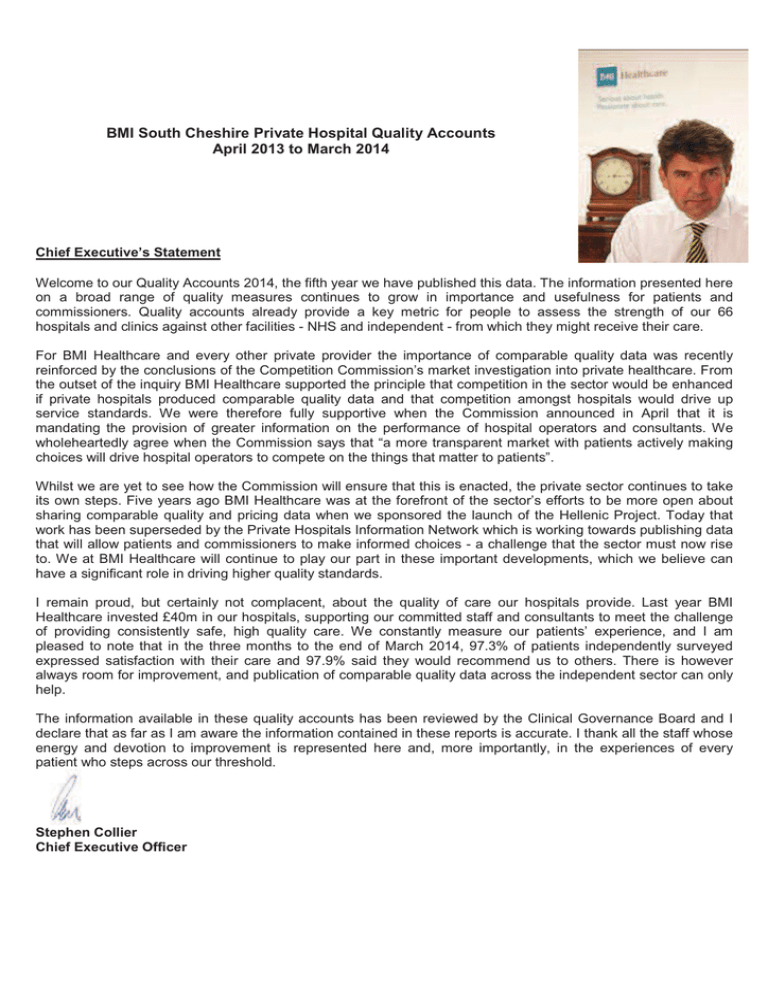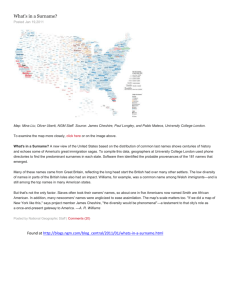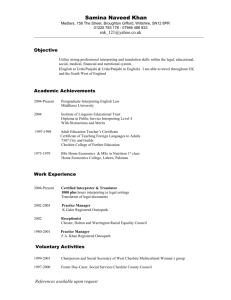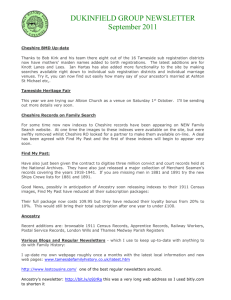
BMI South Cheshire Private Hospital Quality Accounts
April 2013 to March 2014
Chief Executive’s Statement
Welcome to our Quality Accounts 2014, the fifth year we have published this data. The information presented here
on a broad range of quality measures continues to grow in importance and usefulness for patients and
commissioners. Quality accounts already provide a key metric for people to assess the strength of our 66
hospitals and clinics against other facilities - NHS and independent - from which they might receive their care.
For BMI Healthcare and every other private provider the importance of comparable quality data was recently
reinforced by the conclusions of the Competition Commission’s market investigation into private healthcare. From
the outset of the inquiry BMI Healthcare supported the principle that competition in the sector would be enhanced
if private hospitals produced comparable quality data and that competition amongst hospitals would drive up
service standards. We were therefore fully supportive when the Commission announced in April that it is
mandating the provision of greater information on the performance of hospital operators and consultants. We
wholeheartedly agree when the Commission says that “a more transparent market with patients actively making
choices will drive hospital operators to compete on the things that matter to patients”.
Whilst we are yet to see how the Commission will ensure that this is enacted, the private sector continues to take
its own steps. Five years ago BMI Healthcare was at the forefront of the sector’s efforts to be more open about
sharing comparable quality and pricing data when we sponsored the launch of the Hellenic Project. Today that
work has been superseded by the Private Hospitals Information Network which is working towards publishing data
that will allow patients and commissioners to make informed choices - a challenge that the sector must now rise
to. We at BMI Healthcare will continue to play our part in these important developments, which we believe can
have a significant role in driving higher quality standards.
I remain proud, but certainly not complacent, about the quality of care our hospitals provide. Last year BMI
Healthcare invested £40m in our hospitals, supporting our committed staff and consultants to meet the challenge
of providing consistently safe, high quality care. We constantly measure our patients’ experience, and I am
pleased to note that in the three months to the end of March 2014, 97.3% of patients independently surveyed
expressed satisfaction with their care and 97.9% said they would recommend us to others. There is however
always room for improvement, and publication of comparable quality data across the independent sector can only
help.
The information available in these quality accounts has been reviewed by the Clinical Governance Board and I
declare that as far as I am aware the information contained in these reports is accurate. I thank all the staff whose
energy and devotion to improvement is represented here and, more importantly, in the experiences of every
patient who steps across our threshold.
Stephen Collier
Chief Executive Officer
BMI The South Cheshire Private Hospital
A 32 bedded Independent Hospital registered with the Care Quality Commission, with 2 Operating Theatres,
Consulting Suite with 10 Consulting Rooms plus a minor procedure room. The hospital is registered to provide
care for Adults and children over the age of 3 years. The hospital provides care for private and NHS patients. The
hospital is located on the site of Mid Cheshire Hospitals Foundation Trust (Leighton Hospital) and works in
partnership with the Trust and has Service Level Agreements for the provision of specialist clinical support
services from the Trust
Currently the hospital experiences 56% of its activity as NHS patients compared to overall activity. A Standard
Acute Contract is in place with local NHS commissioners covering most of the surgical specialties
BMI Healthcare are registered as a provider with the Care Quality Commission (CQC) under the Health & Social
Care Act 2008. BMI The South Cheshire Private Hospital is registered as a location for the following regulated
services:• Treatment of disease, disorder and injury
• Surgical procedures
• Diagnostic and screening
• Family Planning – for the purposes of insertion of coils for disease management
The CQC carried out an unannounced inspection on 8th October 2013 and found full compliance with standards
below; the full report can be reviewed on the CQC website
Treating people with respect and involving them in their care
Providing care, treatment and support that meets people’s needs
Caring for people safely and protecting them from harm
Staffing
Quality and suitability of management
The South Cheshire Private Hospital has a local framework through which clinical effectiveness, clinical incidents
and clinical quality is monitored and analysed. Where appropriate, action is taken to continuously improve the
quality of care. This is through the work of a multidisciplinary group and the Medical Advisory Committee.
Regional Clinical Quality Assurance Groups monitor and analyse trends and ensure that the quality improvements
are operationalised.
At corporate level the Clinical Governance Board has an overview and provides the strategic leadership for
corporate learning and quality improvement.
There has been ongoing focus on robust reporting of all incidents, near misses and outcomes. Data quality has
been improved by ongoing training and database improvements. New reporting modules have increased the
speed at which reports are available and the range of fields for analysis. This ensures the availability of
information for effective clinical governance with implementation of appropriate actions to prevent recurrences in
order to improve quality and safety for patients, visitors and staff.
At present we provide full, standardised information to the NHS, including coding of procedures, diagnoses and
co-morbidities and PROMs for NHS patients. There are additional external reporting requirements for CQC, Public
Health England (Previously HPA) CCGs and Insurers
BMI is a founding member of the Private Healthcare Information Network (PHIN) UK – where we produce a data
set of all patient episodes approaching HES-equivalency and submit this to PHIN for publication. The data is
made available to common standards for inclusion in comparative metrics, and is published on the PHIN website
http://www.phin.org.uk. This website gives patients information to help them choose or find out more about an
independent hospital including the ability to search by location and procedure.
1. Safety
1.1 Infection prevention and control
The focus on infection prevention and control continues under the
leadership of the Group Director of Infection Prevention and Control and
Group Head of Infection Prevention and Control, in liaison with the
Infection Prevention and Control Lead at the South Cheshire Private
Hospital.
We have had: • Zero cases of MRSA bacteraemia in the last year (NHS
1.17cases/100,000 bed days).
• Zero MSSA bacteraemia cases
• Zero E.coli bacteraemia cases
• Zero of hospital apportioned Clostridium difficile in the last 12 months.
• SSI data is also collected and submitted to Public Health England for orthopaedic surgical procedures.
Our rates of infection, from Apirl 2013 to March 2014 are;
o Hips – 0%
o Knees – 0%
The results of the Infection Prevention and Control environmental audits for the period of October 2012 –
September 2013 are shown in the graph below.
100%
98% 96%
96%
94%
92%
90%
88%
86%
84%
82%
80%
Changing
Rooms
96%
94%
93%
91%
Consulting
Suite
Physio
Theatre
Ward A
91%
Ward B
90%
X-ray
High Impact Intervention Care Bundles Audit Results
Peripheral Intravenous Cannula Insertion
ƐĞƉƚŝĐdĞĐŚŶŝƋƵĞ
ϭϬϬ
ϵϬ
ϴϬ
ϳϬ
ϲϬ
ϱϬ
ϰϬ
ϯϬ
ϮϬ
ϭϬ
Ϭ
,ĂŶĚ,LJŐŝĞŶĞ
WW
^ŬŝŶWƌĞƉĂƌĂƚŝŽŶ
ƌĞƐƐŝŶŐ
ϰ͘ϮϬϭϯ
ϳ͘ϮϬϭϯ
ϭϭ͘ϮϬϭϯ
ϯ͘ϮϬϭϰ
ϰ͘ϮϬϭϰ
ŽĐƵŵĞŶƚĂƚŝŽŶ
Peripheral Intravenous Cannula Ongoing
,ĂŶĚ,LJŐŝĞŶĞ
ϭϬϬ
ϵϬ
ϴϬ
ϳϬ
ϲϬ
ϱϬ
ϰϬ
ϯϬ
ϮϬ
ϭϬ
Ϭ
ŽŶƚŝŶƵŝŶŐůŝŶŝĐĂů
/ŶĚŝĐĂƚŝŽŶ
^ŝƚĞ/ŶƐƉĞĐƚŝŽŶ
ƌĞƐƐŝŶŐ
ĂŶŶƵůĂĐĐĞƐƐ
ĚŵŝŶŝƐƚƌĂƚŝŽŶ^Ğƚ
ZĞƉůĂĐĞŵĞŶƚ
ĂŶŶƵůĂZĞƉůĂĐĞŵĞŶƚ
ϰ͘ϮϬϭϯ
ϳ͘ϮϬϭϯ
ϭϭ͘ϮϬϭϯ
ϯ͘ϮϬϭϰ
ϰ͘ϮϬϭϰ
ŽĐƵŵĞŶƚĂƚŝŽŶ
Surgical Site Infection – Pre-operative
ϭϬϬ
ϵϬ
ϴϬ
ϳϬ
ϲϬ
ϱϬ
ϰϬ
ϯϬ
ϮϬ
ϭϬ
Ϭ
^ĐƌĞĞŶŝŶŐΘ
ĞĐŽůŽŶŝƐĂƚŝŽŶ
WƌĞŽƉĞƌĂƚŝǀĞ
ƐŚŽǁĞƌŝŶŐ
,ĂŝƌZĞŵŽǀĂů
ϰ͘ϮϬϭϯ
ϲ͘ϮϬϭϯ
ϭϭ͘ϮϬϭϯ
ϯ͘ϮϬϭϰ
ϰ͘ϮϬϭϰ
Surgical Site
Infection – Intra operative
ϭϬϬ
ϵϬ
ϴϬ
ϳϬ
ϲϬ
ϱϬ
ϰϬ
ϯϬ
ϮϬ
ϭϬ
Ϭ
^ŬŝŶWƌĞƉĂƌĂƚŝŽŶ
WƌŽƉŚLJůĂĐƚŝĐ
ŶƚŝŽďŝŽƚŝĐƐ
EŽƌŵŽƚŚĞƌŵŝĂ
/ŶĐŝƐĞƌĂƉĞƐ
^ƵƉƉůĞŵĞŶƚĂů
KdžLJŐĞŶ
'ůƵŽĐŽƐĞŽŶƚƌŽů
ϰ͘ϮϬϭϯ
ϳ͘ϮϬϭϯ
ϭϭ͘ϮϬϭϯ
ϯ͘ϮϬϭϰ
ϰ͘ϮϬϭϰ
Surgical
Infection – Post operative
ϭϬϬ
ϵϬ
ϴϬ
ϳϬ
ϲϬ
ϱϬ
ϰϬ
ϯϬ
ϮϬ
ϭϬ
Ϭ
^ƵƌŐŝĐĂů
ƌĞƐƐŝŶŐ
,ĂŶĚ
,LJŐŝĞŶĞ
ϰ͘ϮϬϭϯ
ϲ͘ϮϬϭϯ
ϭϭ͘ϮϬϭϯ
ϯ͘ϮϬϭϰ
ϰ͘ϮϬϭϰ
Urinary Catheter – Insertion
ϭϬϬ
ϵϬ
ϴϬ
ϳϬ
ϲϬ
ϱϬ
ϰϬ
ϯϬ
ϮϬ
ϭϬ
Ϭ
ƐĞƉƚŝĐEŽŶdŽƵĐŚ
dĞĐŚŶŝƋƵĞ
WĞƌƐŽŶĂůWƌŽƚĞĐƚŝǀĞ
ƋƵŝƉŵĞŶƚ
ĂƚŚĞƚĞƌŶĞĞĚĞĚ͍
ůĞĂŶhƌĞƚŚƌĂů
ŵĞĂƚƵƐ
^ƚĞƌŝůĞ͕ĐůŽƐĞĚ
ĚƌĂŝŶĂŐĞƐLJƐƚĞŵ
,ĂŶĚ,LJŐŝĞŶĞ
ŽĐƵŵĞŶƚĂƚŝŽŶ
ϳ͘ϮϬϭϯ
ϭϭ͘ϮϬϭϯ
ϯ͘ϮϬϭϰ
ϰ͘ϮϬϭϰ
Urinary
Site
Catheter – Ongoing
ϭϬϬ
ϵϬ
ϴϬ
ϳϬ
ϲϬ
ϱϬ
ϰϬ
ϯϬ
ϮϬ
ϭϬ
Ϭ
,ĂŶĚ,LJŐŝĞŶĞ
ĂƚŚĞƚĞƌŚLJŐŝĞŶĞ
^ĂŵƉůŝŶŐ
ƌĂŝŶĂŐĞďĂŐ
ƉŽƐŝƚŝŽŶ
ĂƚŚĞƚĞƌ
ŵĂŶŝƉƵůĂƚŝŽŶ
ĂƚŚĞƚĞƌŶĞĞĚĞĚ͍
ϳ͘ϮϬϭϯ
ϭϭ͘ϮϬϭϯ
ϯ͘ϮϬϭϰ
ϰ͘ϮϬϭϰ
Environmental cleanliness is also an important factor in infection prevention and our patients rate the cleanliness
of our facilities highly
1.2 Patient Led Assessment of the Care Environment (PLACE)
We believe a patient should be cared for with compassion and dignity in a clean, safe environment. Where standards
fall short, they should be able to draw it to the attention of managers and hold the service to account. PLACE
assessments will provide motivation for improvement by providing a clear message, directly from patients, about how
the environment or services might be enhanced.
In 2013 we introduced PLACE, which is the new system for assessing the quality of the patient environment, replacing
the old Patient Environment Action Team (PEAT) inspections.
The assessments involve patients and staff who assess the hospital and how the environment supports patient’s
privacy and dignity, food, cleanliness and general building maintenance. It focuses entirely on the care environment
and does not cover clinical care provision or how well staff are doing their job.
The results will show how hospitals are performing nationally and locally. Results of the South Cheshire Private
hospital from 2013 are:
Cleanliness
SCPH
Score
91.57%
BMI
Average
95.33%
Food & Hydration
91.32%
94.48%
Privacy & Dignity
84.76%
87.98%
Condition, Appearance
& Maintenance
85.63%
88.19%
BMI
Range
75.73100
77.4198.35
67.76100
69.997.06
National
Average
95.75%
National
Range
24.06-100
85.41%
36.25-100
88.90%
52.26-100
88.78%
26.67-100
The results are slightly below the national average from BMI Healthcare so action plans are in place to addres te
perceived areas for improvement
1.3 Venous Thrombo-embolism (VTE)
BMI Healthcare, holds VTE Exemplar Centre status by the Department of Health across its whole network of
hospitals including, The South Cheshire Private Hospital. BMI Healthcare was awarded the Best VTE Education
Initiative Award category by Lifeblood in February 2013 and were the Runners up in the Best VTE Patient
Information category.
We see this as an important initiative to further assure patient safety and care. We audit our compliance with our
requirement to VTE risk assessment every patient who is admitted to our facility and the results of our audit on
this has shown. VTE assessment normally runs at a full 100%, the processes are embedded in the care pathways
for relevant patients and are highlighted as an integral part of the care pathway documentation.
The South Cheshire Private Hospital reports the incidence of Venous Thromboembolism (VTE) through the
corporate clinical incident system. It is acknowledged that the challenge is receiving information for patients who
may return to their GPs or other hospitals for diagnosis and/or treatment of VTE post discharge from the Hospital.
As such we may not be made aware of them. We continue to work with our Consultants and referrers in order to
ensure that we have as much data as possible. .
There were no incidents of DVT in 2013 and so far this year which is a positive outcome and the graph visually
demonstrates the improvement since 2012
2. Effectiveness
2.1 Patient reported Outcomes (PROMS)
Patient Reported Outcome Measures (PROMs) are a means of collecting information on the effectiveness of care
delivered to NHS patients as perceived by the patients themselves. PROMS is a Department of Health led
programme.
PROMS participation rates can be variable due to factors outside our control. The initial pre-operative
questionnaire is given to each eligible patient; however we have no control on ensuring that the second stage
questionnaire is completed and returned. There are plans to put in place a process to send out a reminder to the
participating patients at around the time the second questionnaire is sent out that firstly they should expect the
arrival of the questionnaire and secondly the importance of completion and returning
The tables below demonstrate positive performance at The South Cheshire Private Hospital, for Hip and Knee
replacement the perceived health gain is well above the national average, which is a reflection of the clinical
pathways embedded at the hospital. This would indicate that efforts undertaken to deliver a positive ERP is
delivering the necessary results and is enhancing patient experience and clinical outcomes.
As detailed further on in the quality account PROMS results for Groin Hernia – health gain of 0.101 compared to
national average of 0.083 also demonstrates positive patient clinical outcomes
Oxford Hip Score average
2012
South
Cheshire
Q1
Q2
Health gain (Q2 - Q1 average)
14.75
41.873
27.083
17.907
39.224
21.317
England
Copyright © 2011 Re-used with the permission of The Health and Social Care Information Centre. All rights reserved.'
Oxford Knee Score average
2011/2012
South
Cheshire
Q1
Q2
Health gain (Q2 - Q1 average)
19.846
38.615
18.769
18.893
34.902
16.009
England
Copyright © 2013, The Health and Social Care Information Centre. All Rights Reserved.
2.2 Enhanced Recovery Programme (ERP)
The ERP is about improving patient outcomes and speeding up a patient’s recovery after surgery. ERP focuses
on making sure patients are active participants in their own recovery and always receive evidence based care at
the right time. It is often referred to as rapid recovery, is a new, evidence-based model of care that creates fitter
patients who recover faster from major surgery. It is the modern way for treating patients where day surgery is not
appropriate.
ERP is based on the following principles:1. All Patients are on a pathway of care
a. Following best practice models of evidenced based care
b. Reduced length of stay
2. Patient Preparation
a. Pre Admission assessment undertaken
b. Group Education sessions
c. Optimizing the patient prior to admission – i.e HB optimisation, control co-morbidities, medication
assessment – stopping medication plan.
d. Commencement of discharge planning
3. Proactive patient management
a. Maintaining good pre-operative hydration
b. Minimising the risk of post-operative nausea and vomiting
c. Maintaining normothermia pre and post operatively
d. Early mobilisation
4. Encouraging patients have an active role in their recovery
a. Participate in the decision making process prior to surgery
b. Education of patient and family
c. Setting own goals daily
d. Participate in their discharge planning
ERP processes are well advanced at The South Cheshire Private Hospital. The average length of stay for joint
replacement is around 3.5 days. Recent initiatives have involved the anaesthetic element of the pathway, as the
local anaesthetists had been devising an appropriate anaesthetic and pain relief protocol that enhanced ERP
processes and further reduced length of stay by allowing for earlier mobilisation of patients post-operatively. This
involved modification of the types of anaesthetic blocks used, and the withdrawal of routine use of opiate pain
relief pumps. This protocol has only just been approved at the local Trust and is being introduced at the The South
Cheshire Private Hospital
2.3 Unplanned Readmissions within 31 days and unplanned returns to theatre.
Unplanned readmissions and unplanned returns to theatre are normally intrinsically linked as patient mix is predominantly surgical and so would be due to a clinical complication related to the original surgery. 2014 has seen
an increase on previous years and although there are no significantly relevant trends, a number of the returns
have been linked to post-surgical haematomas particularly in Gynaecology and General Surgery. As indicated
although there are no identifiable trends the situation is being monitored by the hospital’s clinical governance
committee. It is believed that the higher uptake of NHS Choose & Book patients who have been recognised in
having higher rates of co-morbidities and complications maybe influencing this measure.
3. Patient experience
3.1 Patient satisfaction
BMI Healthcare is committed to providing the highest levels of quality of care to all of our patients. We continually
monitor how we are performing by asking patients to complete a patient satisfaction questionnaire. Patient
satisfaction surveys are administered by an independent third party.
The above data shows extremely positive patient perception of our service, the weakest performing category is
the discharge process. A working party has been established to develop an action plan to address the identified
weaknesses and areas for improvement within the patient discharge process.
3.2 Complaints
In addition to providing all patients with an opportunity to complete a satisfaction survey BMIThe South Cheshire
Private Hospital actively encourages feedback both informally and formally. Patients are supported through a
robust complaints procedure, operated over three stages:
Stage 1: Hospital resolution
Stage 2: Corporate resolution
Stage 3: Patients can refer their complaint to independent adjudication if they are not satisfied with the outcome at
the other 2 stages.
.
Written complaints are at similar levels in 2013/14 and have reduced consistently from 2011 onwards, the above
rate includes both private and NHS patients, and there is a significant proportion of financially related complaints
which if extracted would reduce the already reasonably low rate of complaints even lower. There are no specific
trends in the nature of the complaints, however within the context of some complaints communication on
discharge and length of time between admission and transfer to theatres have been raised – these aspects are
mirrored in the patient satisfaction surveys undertaken, and are a focus in our service delivery improvement plan
this year
4. CQUINS
The agreed CQUINs for The South Cheshire private Hospital are detailed below. CQUIN achievement was agreed
and reconciled at full 100% achievement for the year.
1. Friends and Family Test
The 2012 national inpatient survey showed that only 13% of patients in acute care hospital inpatient wards
and A&E departments were asked for their feedback. Targets to increase this participation rate were
achieved
2. NHS Safety Thermometer
This measure is devised to reduce harm, three elements were identified: pressure ulcers, patient falls, and
urinary tract infections in patients with a catheter. The data collected resulted in full achievement of the
CQUIN requirement.
3. VTE
To reduce avoidable death, disability and chronic ill health form venous thromboembolism (VTE). As
described earlier in the quality account BMI Healthcare has Exemplar status and the zero incident rate is
indicative of the robust processes in place
ϰ͘ Dementia Awareness
To improve staff awareness of the needs of patients with dementia and increased recognition of patients
withĚĞŵĞŶƚŝĂ͘ŶĂǁĂƌĞŶĞƐƐĂŶĚƚƌĂŝŶŝŶŐĐĂŵƉĂŝŐŶǁĂƐŝŶŝƚŝĂƚĞĚĂĐƌŽƐƐƚŚĞĐůŝŶŝĐĂůƚĞĂŵƐ
ϱ͘ Perioperative care
Reducing harm around perioperative care – the measure was to maintain normothermic patients to ensure
that patient’s core body temperature was maintained at recommended levels. This parameter was fully
achieved.
5. National Clinical Audits
The South Cheshire Private Hospital was only eligible to participate in National Joint Registry audit and all joint
replacements are submitted to this.
The latest NJR Report detail for The South Cheshire Private Hospital was: Number of joint replacements – 177
Consent rate – 99%
Linkability – 95%
No mortality within the period
The data reflects an extremely high performance and compliance with this audit
Research
No NHS patients were recruited to take part in research.
6. Priorities for service development and improvement
Identified priorities for service development and improvement this year are as follows:1. Improving patients’ experience and perception of the discharge process. The patient satisfaction surveys
undertaken have identified this area as the weakest performing aspect of the patient pathway. A
multidisciplinary working party has been established to develop an improvement plan.
2. An action plan to improve post discharge contact with patients to monitor positive outcomes, identify and
address any post-discharge issues and provide more support to patients who have just left the hospital
3. Feedback from patients has identified there could be improvement in the processes surrounding the period
from when a patient is admitted to the time that the patient is sent down to theatre. The potentially
prolonged timescales are seen to cause anxiety and concern, actions surrounding possibly staggering
admission times and improved communication between theatres and wards would appear to be the focus
of attention
4. Despite a reasonably positive PLACE audit last year an action plan to address identified areas for
improvement.
7. Mandatory Quality Indicators
8.1 The value and banding of the summary hospital-level mortality indicator (SHMI) for the South Cheshire Private
Hospital for the reporting period.
Unit
0
Reporting Period
Oct 11 – June 13
National
Average
1.006
Highest National
Score
1.1822
Lowest National
Score
0.6735
The South Cheshire Private Hospital is not able to report specifically on this indicator as the HSCIC data does not
contain independent sector data, however the hospital did not experience any peri-operative mortality (expected
or unexpected).
8.2 The South Cheshire Private Hospital’s patient reported outcome measures scores for
(i) Groin hernia surgery
Unit
0.101
Reporting Period
Apr 12 – Mar 13
National
Average
0.083
Highest National
Score
0.157
Lowest National
Score
0.014
The South Cheshire Private Hospital considers that this data as described is well above the national average and
so is a positive outcome.
(ii) Varicose vein surgery
Unit
No Data
Reporting Period
Apr 12 – Mar 13
National
Average
-8.738
Highest National
Score
8.172
Lowest National
Score
-15.918
The South Cheshire Private Hospital has no data as no eligible varicose vein surgery was undertaken in the
period. Varicose vein surgery is categorized as a procedure of limited clinical value, however there are criteria that
would justify surgery. This will be explored through the consultant providers and commissioners.
(iii) Hip replacement surgery
Unit
27.083
Reporting Period
Apr 12 – Mar 13
National
Average
Highest National
Score
Lowest National
Score
21.280
24.684
17.124
The South Cheshire Private Hospital considers that this data is an excellent reflection of the clinical pathways
linked to its joint replacement ERP programme.
(iv) Knee replacement surgery during the reporting period.
Unit
18.769
Reporting Period
Apr 12 – Mar 13
National
Average
15.99
Highest National
Score
20.37
Lowest National
Score
12.20
The South Cheshire Private Hospital considers that this data is an excellent reflection of the clinical pathways
linked to its joint replacement ER programme.
8.3 (i) No treatment for under 18’s is allowed within the NHS contractual arrangements and so there is a nil return
against the parameter of 0 – 14 year olds readmitted to hospital.
8.3.(ii)The percentage of patients aged 18 or over readmitted to a hospital which forms part of the The South
Cheshire Private Hospital within 28 days of being discharged during the reporting period is shown below: Unit
0.48%
Reporting Period
Jan 13 – Dec13
National
Average
10.01
Highest National
Score
14.51
Lowest National
Score
5.54
The South Cheshire Private Hospital has a very low re-admission rate which is a positive reflection on the quality
of clinical services and care provided.
8.4 The South Cheshire Private Hospital responsiveness to the personal needs of its patients during the reporting
period.
Unit
93.4%
Reporting Period
2012 - 2013
National
Average
68.1%
Highest National
Score
84.4%
Lowest National
Score
57.4%
The South Cheshire Private Hospital considers that this data is as an excellent reflection on the perceived quality
of care delivered to patient at the hospital. It strives to ensure that this level of satisfaction is maintained now and
in the future. It is believed that this high score is based on the focus to treat patients as individuals and response
to their specific needs
8.5 The percentage of patients who were admitted to The South Cheshire Private Hospital and who were risk
assessed for venous thromboembolism during the reporting period.
Unit
99%
Reporting Periods
(at least last two
reporting periods)
Apr 13 – Jan 14
National
Average
Highest National
Score
Lowest National
Score
96%
100%
79%
The South Cheshire Private Hospital collects this data on a monthly basis and the result reflects the corporate
status as a VTE Exemplar organisation.
8.6 There was a zero rate per 100,000 bed days of cases of C difficile infection reported within the The South
Cheshire Private Hospital amongst patients aged 2 or over during the reporting period.
Unit
Zero
Reporting Period
Apr 12 – Mar 13
National
Average
17.3
Highest National
Score
30.8
Lowest National
Score
0
The South Cheshire considers that this zero incidence result is due to its comprehensive pre-admission
processes, and infection prevention and control protocols. Any patients identified as high risk due to their medical
history are screened thoroughly before admission and monitored closely during their stay
8.7 The number and, where available, rate of patient safety incidents reported within the South Cheshire Private
Hospital during the reporting period, and the number and percentage of such patient safety incidents that resulted
in severe harm or death.
Number of patient safety incidents reported
Unit
162
Reporting Period
Apr 12 – Mar 13
National
Average
44.55
Highest National
Score
1,810
Lowest National
Score
0
National
Average
7.76
Highest National
Score
30.95
Lowest National
Score
1.68
Rate of patient safety incidents reported
Unit
5.34
Reporting Period
Apr 12 – Mar 13
Number of patient safety incidents that resulted in severe harm or death
Unit
Zero
Reporting Period
Apr12 – Mar 13
National
Average
0.64
Highest National
Score
28
Lowest National
Score
0
Percentage of patient safety incidents that resulted in severe harm or death
Unit
Zero%
Reporting Periods
(at least last two
reporting periods)
Apr 12 – Mar 14
National
Average
Highest National
Score
Lowest National
Score
0.9%
2.9%
0%
The South Cheshire Private Hospital has a strong incident reporting culture so the number of incidents reported
above is a true reflection of the patient related incidents. There are no significantly sinister trends and the nature
of the majority of the incidents have been categorised as minor. There have been no reported incidents that
caused severe harm or death which is obviously a very positive situation
8.8 The percentage of staff employed by the (name of hospital) during the reporting period, who would
recommend the South Cheshire Private Hospital as a provider of care to their family or friends.
Unit
91%
Reporting Periods
Feb 13 – Feb14
National
Average
64.6
Highest National
Score
96.4
Lowest National
Score
33.7
The South Cheshire Private Hospital considers that this data is positive as the result is towards the highest end of
national performance. Following the comprehensive staff survey in February 2014 a representative staff group is
to be set up to discuss the outcomes and identify areas for improvement.
8. Non-Mandatory Quality Indicators
9.1 The percentage of patients who received care as inpatients or discharged from A &E during the reporting
period, who would recommend the South Cheshire Private Hospital as a provider of care to their family or friends.
Unit
83%
Reporting Period
Apr 13 – Mar 14
National
Average
66.2
Highest National
Score
94.4
Lowest National
Score
35.6
The South Cheshire Private Hospital considers that this data is a reasonably positive outcome being well above
the national average. However as the hospital strives for the best possible quality performance it is hoped that the
identified priorities for service development and improvement will improve this measure for 2015.







